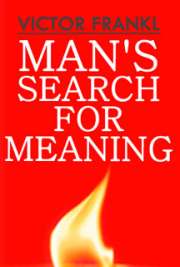Imagine a world stripped bare of its comforts, where basic needs become a constant struggle, and hope seems but a distant glimmer. For Viktor Frankl, this was not a nightmare; it was his reality during the Holocaust. Imprisoned in a Nazi concentration camp, stripped of his identity and subjected to unspeakable cruelty, Frankl found himself facing the ultimate existential question: What is the meaning of life? From this harrowing experience, he emerged not only as a survivor but also as a pioneer of logotherapy, a school of psychotherapy that emphasizes the will to meaning as the primary driving force in life. His book, “Man’s Search for Meaning,” is a testament to his resilience, a beacon of hope for those grappling with life’s challenges, and a profound philosophical exploration of the human spirit.

Image: www.pinterest.com
Frankl’s book is not simply a chronicle of his experiences in Auschwitz. It is a journey into the depths of the human psyche, revealing how even in the most desolate circumstances, the human spirit can find meaning and purpose. Frankl’s insights are universal, applying not only to those facing extreme hardship but also to individuals struggling with everyday anxieties, existential crises, and the feeling of meaninglessness. This book offers a powerful lens through which to understand the complexities of the human experience, offering solace, guidance, and a newfound appreciation for the inherent capacity for resilience and meaning-making within us all.
The Power of the Will to Meaning
At the heart of Frankl’s philosophy is the concept of the “will to meaning.” Frankl believed that the human being is fundamentally motivated by a drive to find meaning in life. This meaning is not something predetermined or externally imposed; it is an active pursuit, a continuous process of searching, discovering, and creating. This drive, he argued, is more potent than the instinctual drives of survival or pleasure.
Frankl observed that in the concentration camps, those who clung to a sense of meaning – whether it was a loved one they hoped to see again, a work of art they dreamt of creating, or a spiritual belief they held dear – were more likely to survive. The inmates who lost their sense of purpose succumbed to despair and ultimately to death. Frankl’s experiences demonstrated that the will to meaning, even in the face of unimaginable hardship, is a powerful force for survival.
Facing the Existential Vacuum: Finding Meaning in Life
The existential vacuum, a state of meaninglessness and apathy, is a challenge that many people experience in modern life. It can stem from feelings of isolation, lack of purpose, or a sense that life is simply not worth living. In “Man’s Search for Meaning,” Frankl provides a framework for recognizing and confronting this vacuum. He outlines three main sources of meaning in life:
- Work and Creation: We find meaning by engaging in meaningful work or activities that allow us to contribute to the world. This includes artistic pursuits, intellectual work, and any kind of endeavor that leaves a lasting positive impact.
- Love and Relationships: Meaning can also be found through deep and authentic connections with others. It might be the love of family, friends, or romantic partners, or even the compassionate connection we build with strangers.
- Attitudes: The way we choose to face life’s challenges, both big and small, is also key to finding meaning. This involves choosing a positive and courageous attitude, seeing adversity as an opportunity for growth, and cultivating a sense of acceptance.
A Path to Finding Your Purpose
Frankl’s philosophy, while deeply rooted in his experiences in a concentration camp, resonates with many individuals facing the challenges of everyday life. It provides a roadmap for finding meaning in a world that can often feel chaotic and overwhelming. Here are some practical insights from the book that can be applied to your own life:
- Focus on the Present: Frankl emphasizes the importance of living in the moment, fully engaging with the present rather than dwelling on the past or worrying about the future. This helps us find meaning in the everyday experiences that we sometimes take for granted.
- Cultivate Mindfulness: Observing your thoughts and feelings non-judgmentally can help you identify patterns of negative thinking that may be contributing to feelings of meaninglessness.
- Practice Gratitude: Focusing on the things you are grateful for, even in difficult times, can shift your perspective and help you find joy in the present moment.
- Embrace Challenges as Opportunities for Growth: Frankl viewed adversity not as an obstacle but as an opportunity for learning and growth. By seeing challenges as opportunities, you can cultivate resilience and find meaning in overcoming them.
- Engage in Meaningful Acts: Find ways to contribute to the world around you, whether by volunteering, helping a friend in need, or pursuing a hobby that brings you joy and allows you to express your creativity.

Image: comreralera.weebly.com
Man Search For Meaning By Viktor Frankl Pdf
In Conclusion
“Man’s Search for Meaning” is not simply a Holocaust memoir; it is a timeless guide for anyone seeking a deeper understanding of life’s meaning and purpose. Frankl’s insights are powerful, practical, and utterly life-affirming. He reminds us that even in the darkest of times, we have the power to find meaning, to choose hope, and to leave a positive impact on the world. The book is a testament to the resilience of the human spirit and a source of inspiration for anyone facing the challenges of modern life. Pick up a copy today and embark on your own journey towards a more meaningful existence.






